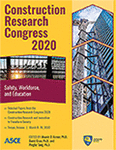Construction Research Congress 2020
The Pedagogical Value of Virtual Reality Training for Electrical Workers on Energy Storage and Microgrid Systems
Publication: Construction Research Congress 2020: Safety, Workforce, and Education
ABSTRACT
With the increased adoption of energy storage and microgrid (ESAM) systems around the world, there is a need to develop comprehensive training programs to ensure the safety of electrical workers who work on these systems. Virtual reality (VR) has been applied to education in many fields and proven to be valuable in improving learning. However, systematic research evaluating the pedagogical value of VR training for electrical workers in dangerous environments is minimal. This research focused on the development of two VR training scenario including walkthrough and situational assessment. Researchers evaluated training with participants using both an immersive model in a head-mounted VR display and a presentation with videos taken from VR model navigation. A focus group meeting was conducted along with surveys to collect information regarding the value, feature needs, perception of learning, and future uses of VR for the training of electrical workers. The results show that immersive VR training is more valuable than video-based training in supporting knowledge understanding, engaging participants, and increasing skills to perform tasks. The focus group discussion demonstrated that features like immersion, ease of control, and constant navigation were important in immersive VR training. Participants also suggested developing additional hazard management scenarios and considering the use of augmented reality (AR) for future training.
Get full access to this article
View all available purchase options and get full access to this chapter.
REFERENCES
Anderson, P. H., and Lawton, L. (2009). “Business simulations and cognitive learning: Developments, desires, and future directions.” Simulation & Gaming, 40(2), 193–216.
Buriol, T. M., Rozendo, M., de Geus, K., Scheer, S., and Felsky, C. (2009). “A virtual reality training platform for live line maintenance of power distribution networks.” ICBL2009-International Conference on Interactive Computer Aided Blended Learning, 1–13.
Castronovo, F. (2016). “Assessing problem-solving skills in construction education with the virtual construction simulator.” Ph.D. dissertation, The Pennsylvania State University.
Cordova, D. I., and Lepper, M. R. (1996). “Intrinsic motivation and the process of learning: Beneficial effects of contextualization, personalization, and choice.” Journal of educational psychology, 88(4), 715.
Dickinson, J. K., Woodard, P., Canas, R., Ahamed, S., and Lockston, D. (2011). “Game-based trench safety education: development and lessons learned.” Journal of Information Technology in Construction (ITcon), 16(8), 119–134.
Feinstein, A. H., and Cannon, H. M. (2002). “Constructs of simulation evaluation.” Simulation & Gaming, 33(4), 425–440.
Garris, R., Ahlers, R., and Driskell, J. E. (2002). “Games, motivation, and learning: A research and practice model.” Simulation & gaming, 33(4), 441–467.
Geary, D. C. (1995). “Reflections of evolution and culture in children’s cognition: Implications for mathematical development and instruction.” American psychologist, 50(1), 24.
Greuter, S., Tepe, S., Peterson, J. F., Boukamp, F., d’Amazing, K., Quigley, K., van der Waerden, R., Harris, T., Goschnick, T., and Wakefield, R. (2012). “Designing a game for occupational health and safety in the construction industry.” ACM, 13.
Halpin, M., Halpin, R., and Curtis, P. (2015). “Simulation-based electrical safety training.” IEEE, 1137–1142.
Herrington, J., and Oliver, R. (1995). “Critical characteristics of situated learning: Implications for the instructional design of multimedia.” Learning with technology, 235-262.
Ke, F. (2011). “A qualitative meta-analysis of computer games as learning tools.” Gaming and Simulations: Concepts, Methodologies, Tools and Applications, IGI Global, 1619–1665.
Kolb, D. A. (2014). Experiential learning: Experience as the source of learning and development. FT press.
Maxwell, D., and McLennan, K. (2012). “Case Study: Leveraging Government and Academic Partnerships in MOSES (Military Open Simulator [Virtual World] Enterprise Strategy).” Association for the Advancement of Computing in Education (AACE), 1604–1616.
Mitchell, A., and Savill-Smith, C. (2004). “The use of computer and video games for learning: A review of the literature.” Learning and Skills Development Agency, London.
Myers, E., and Francis, C. (2011). “Simulation-based electrical safety training: An innovation in safety culture.” IEEE, 1–3.
Nikolic, D., and Messner, J. I. (2012). “Measuring the Value of" All Play and No Work": Can the Rigorous Assessment of Simulation Games Drive Innovative Teaching in Construction?” Construction Research Congress 2012: Construction Challenges in a Flat World, 2101–2110.
Parasuraman, A. (1981). “Assessing the worth of business simulation games: Problems and prospects.” Simulation & Games, 12(2), 189–200.
Park, C.-S., and Kim, H.-J. (2013). “A framework for construction safety management and visualization system.” Automation in Construction, 33, 95–103.
Parmar, D., Bertrand, J., Shannon, B., Babu, S. V., Madathil, K., Zelaya, M., Wang, T., Wagner, J., Frady, K., and Gramopadhye, A. K. (2014). “Interactive breadboard activity simulation (IBAS) for psychomotor skills education in electrical circuitry.” IEEE, 181–182.
Piaget, J. (1970). “Piaget’s theory. Manual of Child Psychology. PH Mussen.” Carmichael's Manual of Child Psychology, ed. P. H. Mussen, Wiley, New York.
Schunk, D. H. (2012). Learning theories an educational perspective sixth edition. Pearson.
Tanaka, E. H., Paludo, J. A., Bacchetti, R., Gadbem, E. V., Domingues, L. R., Cordeiro, C. S., Giraldi, O., Gallo, G. A., da Silva, A. M., and Cascone, M. H. (2017). “Immersive virtual training for substation electricians.” IEEE, 451–452.
Tanaka, E. H., Paludo, J. A., Cordeiro, C. S., Domingues, L. R., Gadbem, E. V., and Euflausino, A. (2015). “Using Immersive Virtual Reality for Electrical Substation Training.” International Association for Development of the Information Society.
Warren, D. V. (2001). “Design and development of simulation/game software: Implications for higher education.” Ph.D. dissertation, University of British Columbia.
Information & Authors
Information
Published In
Construction Research Congress 2020: Safety, Workforce, and Education
Pages: 574 - 582
Editors: Mounir El Asmar, Ph.D., Arizona State University, David Grau, Ph.D., Arizona State University, and Pingbo Tang, Ph.D., Arizona State University
ISBN (Online): 978-0-7844-8287-2
Copyright
© 2020 American Society of Civil Engineers.
History
Published online: Nov 9, 2020
Published in print: Nov 9, 2020
Authors
Metrics & Citations
Metrics
Citations
Download citation
If you have the appropriate software installed, you can download article citation data to the citation manager of your choice. Simply select your manager software from the list below and click Download.
